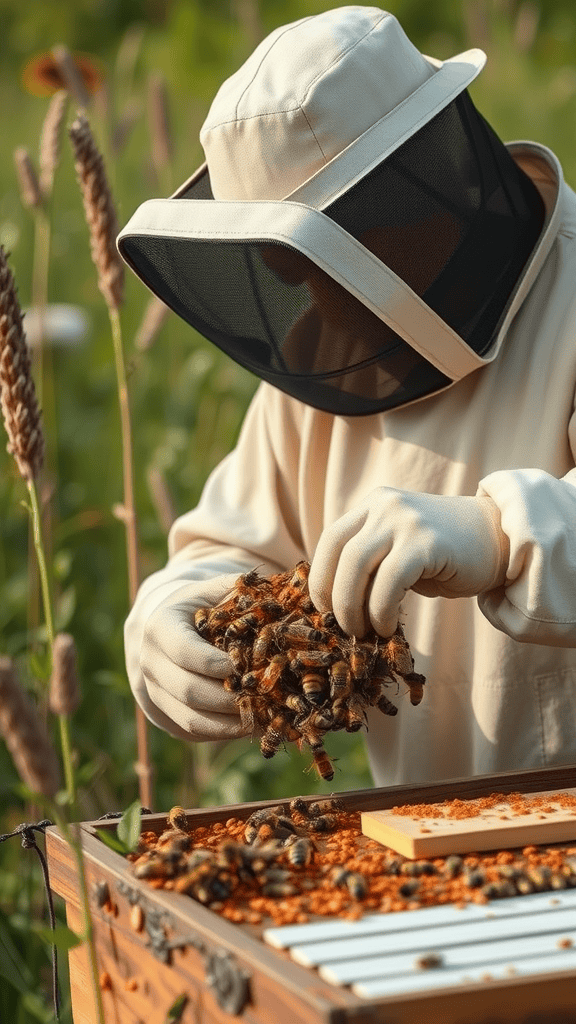The Therapeutic Benefits of Beekeeping: Exploring Emotional and Physical Healing
Beekeeping, or apiculture, has been a practice for centuries, but recently, people have begun to recognize its therapeutic benefits. Tending to bees can offer emotional and physical healing, making it a unique form of therapy. Engaging with these resilient creatures can bring about feelings of calmness and satisfaction, enhancing overall well-being.
One of the most significant emotional benefits of beekeeping is how it helps individuals connect with nature. In our fast-paced, technology-driven world, many people feel overwhelmed and disconnected. Spending time in the presence of bees allows you to slow down, observe their behavior, and appreciate the intricate balance of nature. This reconnection can lead to reduced anxiety and improved mood.
Another vital aspect is the therapeutic rhythm of beekeeping activities. The repetitive nature of tasks such as inspecting hives, maintaining equipment, and collecting honey creates a form of mindfulness. When you engage in these tasks, your focus shifts from daily stressors to the present moment. This practice of mindfulness can diminish feelings of depression and increase emotional resilience.
- Physical Benefits: Beekeeping also has physical health benefits. The act of caring for bees often involves outdoor activity, which can improve your physical fitness. Lifting hive boxes, walking between beehives, and performing general maintenance work all contribute to increased physical activity.
- Boosting Immune Function: Exposure to bees and their environment can potentially enhance your immune system. Honey and bee products, such as propolis, are known for their natural health benefits and can support immune function.
The unique bond formed between a beekeeper and their bees can also foster a sense of purpose and responsibility. Caring for the bees encourages you to develop routines and rituals, which can be incredibly grounding. This sense of responsibility promotes positive feelings of achievement and self-worth, helping to alleviate symptoms of anxiety and depression.
When you explore your passion for beekeeping, you often join a community that shares similar interests. Engaging with fellow beekeepers creates opportunities for social interaction and support. Social connections are crucial for mental health, and participating in a beekeeping group can combat feelings of isolation. Sharing experiences, troubleshooting problems, and celebrating successes with others can boost your emotional state significantly.
Moreover, witnessing the life cycle of bees can serve as a powerful metaphor for personal growth and resilience. Observing how bees work tirelessly together, adapt, and overcome challenges can inspire you in your daily life. This can provide valuable lessons on perseverance and the importance of teamwork, enriching your emotional landscape.
In terms of specific therapeutic applications, many organizations are beginning to utilize beekeeping in structured programs, particularly for children and adults facing mental health challenges. Initiatives such as therapeutic beekeeping are gaining ground as a way for individuals to learn stress management techniques while also developing skills that improve their self-esteem.
- Therapeutic Beekeeping Programs:
- Structured sessions that involve hands-on learning about beekeeping.
- Opportunities for participants to engage with bees safely.
- Supportive environments that promote discussion about emotional experiences.
By embracing beekeeping, you allow yourself an enriching experience that could change your life. You harness the power of nature, understand the importance of living beings, and engage in meaningful work that impacts both your life and the environment. This nurturing practice provides not just honey but a healing journey for your mind, body, and spirit.
In essence, incorporating beekeeping into your life can be a worthwhile venture for emotional and physical healing. Whether as a hobby or a serious commitment, tending to bees can offer you therapeutic benefits that extend far beyond the hive. As you delve into this rewarding practice, you may find not only a sense of peace but also a newfound appreciation for the world around you.
How Beekeeping Can Foster Mindfulness and Connection with Nature
Beekeeping is more than just a way to produce honey; it can also be a powerful tool to enhance mindfulness and deepen your connection with nature. Engaging with bees and the beekeeping process allows individuals to immerse themselves in a world filled with life, energy, and purpose. You might wonder how working with bees can be therapeutic and beneficial for mental well-being. Here’s a closer look at why beekeeping promotes a mindful approach to life that resonates with our surroundings.
When you step into the world of beekeeping, you enter a unique environment where each moment matters. Here are some ways that this practice helps you develop mindfulness:
- Focus on the Present: In beekeeping, you must pay attention to the small details, from observing bee behavior to checking hive health. This deep level of engagement encourages you to shed distractions, fostering a profound awareness of the present moment.
- Connection to Nature: Working with bees helps you appreciate the interconnectedness of life. You’ll find yourself more aware of the seasons, the weather, and the essential role bees play in our ecosystem, instilling a greater respect for nature.
- Calming Routine: Regularly tending to your hives can become a grounding ritual. The repetitive actions of inspection and maintenance can have a meditative effect, helping to reduce stress and promote a sense of peace.
- Learning Patience: Beekeeping requires patience, as you often wait for hives to grow or for honey to be harvested. This teaches you to embrace waiting and to tolerate uncertainty, both crucial components of mindfulness.
Beekeeping also encourages a sense of community and connectedness. Many beekeepers share their passion, forming local clubs or online groups. Here’s how this community aspect enhances your mental well-being:
- Shared Experiences: Discussing challenges and successes with fellow beekeepers fosters bonds that strengthen your support network.
- Learning Opportunities: Attending workshops and talking with more experienced beekeepers provides opportunities to deepen your knowledge, boosting confidence and skill development.
- Encouragement: Community members often motivate each other to continue pursuing beekeeping, ensuring that everyone feels supported in their journey.
Additionally, the act of caring for bees nurtures a sense of purpose. As you nurture a colony, watching it thrive brings immense satisfaction. Here are some benefits that arise from cultivating this sense of responsibility:
- Meaningful Contribution: By keeping bees, you contribute to the environment and help support biodiversity, knowing your actions have a positive impact.
- Sense of Achievement: Successfully managing a hive offers a tangible reward, boosting your self-esteem and reinforcing that hard work leads to rewarding outcomes.
- Encouraging Compassion: Caring for living creatures can heighten your empathy, as it requires understanding the bees’ needs and behaviors—shifting your perspective from one centered on self to one encompassing the larger ecosystem.
One aspect of beekeeping that many find particularly enriching is the sensory experience it offers. Engaging your senses while working with bees enhances your overall experience:
- Visual: Observing the intricate patterns of honeycombs and the dance of bees can captivate your senses.
- Auditory: The buzzing sounds provide a natural soundtrack that many find soothing and calming.
- Olfactory: The sweet aroma of honey and beeswax creates a rich, sensory environment that can feel grounding.
As you participate in beekeeping, remember that the journey goes beyond just managing hives. You’ll find that stepping into this natural world allows you to cultivate mindfulness, enrich your understanding of nature, and establish valuable connections with fellow enthusiasts. Whether you’re a seasoned beekeeper or just starting, embracing this practice can foster resilience, joy, and a sense of belonging in an increasingly chaotic world. Why not give it a try? The bees are waiting to be your teachers.
Conclusion
Beekeeping offers a unique therapeutic outlet that combines emotional healing with physical benefits, making it an appealing option for those seeking solace from the stresses of modern life. Engaging with these fascinating creatures can help you connect with your emotions, providing an opportunity for reflection and calmness. The act of tending to bees allows you to release anxiety and nurture a sense of accomplishment. Many individuals report feeling significant improvements in their mental health after incorporating beekeeping into their routine.
Moreover, beekeeping encourages mindfulness and fosters a profound connection with nature. Working alongside bees teaches you to appreciate the delicate balance of the environment. This not only brings a sense of peace but also a deeper understanding of one’s place in the ecosystem. By observing the bees’ activities, you develop a rhythm that can ground you and enhance your overall well-being.
If you’re looking for a way to improve your mental and physical health while nurturing a rewarding hobby, beekeeping could be the answer. The harmonious blend of responsibility and tranquility that it offers makes it a remarkable experience. So, why not consider embracing beekeeping as a form of therapy? Whether you’re dealing with stress, seeking a new pastime, or wanting to improve your connection with nature, beekeeping could be the fulfilling journey you’ve been seeking. Give it a try and discover how bees can positively impact your life.
As an Amazon Associate, I earn from qualifying purchases.

